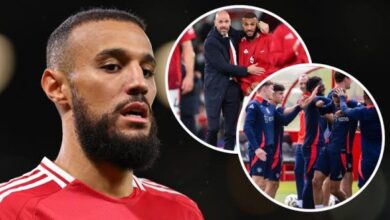They can appoint many managers as they want but no progress will be made until that is changed- Ex-Manchester United’s coach Erik ten Hag names only ONE changed needed at Manchester United before the club could succeed.

They Can Appoint As Many Managers As They Want, But No Progress Will Be Made Until That Changes!” – Ex-Manchester United Boss Erik ten Hag Names the ONE Change That Will Transform the Club’s Future
For years, Manchester United has been stuck in a frustrating cycle of managerial changes, false dawns, and unfulfilled promises. Since Sir Alex Ferguson’s legendary reign ended in 2013, the club has gone through a carousel of managers—David Moyes, Louis van Gaal, José Mourinho, Ole Gunnar Solskjær, Ralf Rangnick, and most recently, Erik ten Hag. But despite the vast resources, marquee signings, and tactical adjustments, United still finds itself struggling to reclaim its past dominance.
Now, former Manchester United boss Erik ten Hag has delivered a brutally honest verdict on what is holding the club back. Speaking candidly, Ten Hag dismissed the idea that simply changing managers would solve United’s problems. Instead, he pinpointed a single, fundamental issue that must be addressed before the club can return to its former glory.
“They can appoint as many managers as they want, but no progress will be made until that is changed,” Ten Hag declared. But what exactly is the ONE change he believes United desperately needs?
According to Ten Hag, the club’s football structure and decision-making process is completely flawed. He hinted that without a proper sporting director and a clear, long-term vision, United will continue to spiral into mediocrity no matter who sits in the dugout. Over the years, key football decisions have been influenced by commercial interests rather than sporting priorities, leaving managers powerless to build a cohesive, winning squad.
United’s chaotic transfer strategy, inconsistent recruitment, and lack of footballing identity have been the root cause of their downfall. Unlike clubs like Manchester City, Liverpool, and Arsenal, where recruitment and footballing philosophies align, United still operates with a short-term mentality, throwing money at problems rather than fixing them at the core.
This isn’t the first time a former United manager has spoken out about the club’s dysfunctional structure. Mourinho previously warned that United lacked a solid foundation for success, while Ralf Rangnick famously called for “open-heart surgery” at the club. Yet, years later, the same problems persist.
With Sir Jim Ratcliffe’s INEOS group now taking charge of football operations, there is hope that change may finally come. But will United finally break free from their self-inflicted misery? Or will the club continue to make the same mistakes, expecting different results?
One thing is certain—until the core issue is fixed, United will remain stuck in a cycle of failure, regardless of who
the manager is.
Erik ten Hag, reflecting on his tenure as Manchester United’s manager, emphasized that managerial changes alone are insufficient to address the club’s deep-seated issues. He identified the club’s flawed football structure and decision-making process as the primary obstacles to progress. Ten Hag highlighted the absence of a proper sporting director and a clear, long-term vision, noting that commercial interests often overshadow sporting priorities, thereby undermining managers’ efforts to build cohesive, winning squads.
This perspective aligns with observations from other former United managers. José Mourinho previously cautioned about the club’s lack of a solid foundation for success, and Ralf Rangnick famously called for “open-heart surgery” to rectify systemic problems. Despite these warnings, the club has continued to struggle, with recent financial reports revealing a loss of £27.7 million in the last quarter of 2024, partly due to managerial dismissals and a 42% decline in broadcasting revenue from missing the Champions League.
The recent involvement of Sir Jim Ratcliffe’s INEOS group, which acquired a 27.7% stake in the club, has introduced significant changes, including cost-cutting measures and restructuring of football operations. However, these actions have been met with mixed reactions from fans and pundits. Jamie Redknapp predicted “18 months of pain” for the club, emphasizing the need for a cultural overhaul and patience to attract the right individuals and change the club’s trajectory.
The appointment of Ruben Amorim as manager was intended to bring fresh tactical ideas and a new approach. However, under his leadership, the team’s performance has declined, with United currently positioned 15th in the Premier League and facing financial constraints that hinder necessary squad rebuilds.
In summary, while managerial appointments bring new perspectives, addressing Manchester United’s core structural and cultural issues remains imperative for the club to regain its former glory.








